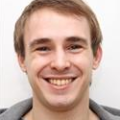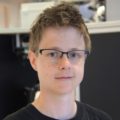Exploring the Complexity of Pore Space of a Catalyst Particle
Joint Doctorate
1st promotor: Prof. Bert Weckhuysen (UU)
2nd promotor: Prof. Albert van den Berg (UT)
1st supervisor and co-promotor: Assistant Prof. Florian Meirer (UU)
2nd supervisor and co-promotor: Associate Prof. Mathieu Odijk (UT)
Affiliation: Utrecht University and University of Twente
Research theme: Smart Biomass Conversion
Functional materials are essential for modern society and of those catalysts play an important role in producing everyday life materials, such as plastics and fuel. To make these materials more efficiently and sustainably we need to understand a catalysts nature in order to design a better one. Porosity is such an important catalyst property, which is needed to effectively bring the (feedstock) molecules that should be transformed/consumed to the (catalytic) site that generates the product.
In rationally designing a catalyst’s pore space it becomes possible to tune its properties towards the desired function. However, the pore space of a catalyst is highly complex and involves length scales from the atomic level to fractions of a millimeter. Therefore, many aspects of how feedstock molecules travel through these pores are still poorly understood.
The aim of this research project is to unravel some of these mysteries by designing model systems using state-of-the-art 3D printing technology to mimic porous materials with increasing levels of complexity. Inspecting the diffusion properties of these models will then allow following diffusion probes, while they travel through the pores. By connecting these observations to simulations we will be able to predict mass transport properties of future rationally designed improved catalysts.
Keywords:
- Mass transport
- Hierarchically complex porous materials
- Micro- and nanofluidics
- Single particle tracking
- X-ray microscopy














